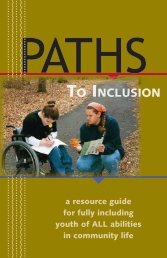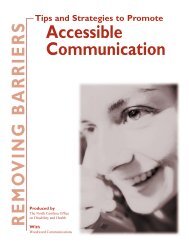Active Citizens 101 - National Service Inclusion Project
Active Citizens 101 - National Service Inclusion Project
Active Citizens 101 - National Service Inclusion Project
You also want an ePaper? Increase the reach of your titles
YUMPU automatically turns print PDFs into web optimized ePapers that Google loves.
Equality and Liberty, cont.<br />
HANDOUT 4.1 (C)-CIVIL RIGHTS LAWS<br />
Civil Rights Laws<br />
What are some places in your community<br />
where you see people of different races<br />
together<br />
The Fourteenth Amendment forbids race<br />
discrimination by state and local governments.<br />
But before the 1960s, privately<br />
owned facilities like factories, hotels, and<br />
restaurants did not have to serve or hire<br />
blacks if they didn't want to. Discrimination<br />
was not against the law if it occured on<br />
“private property.”<br />
African Americans wanted new laws to<br />
stop all discrimination. They wanted the<br />
right to have jobs that paid well, to live in<br />
any community, and to go to any hotel or<br />
restaurant. Other Americans agreed and<br />
worked with blacks to fight racism. Together<br />
they asked people to sign petitions and<br />
write letters to Congress. They organized<br />
protest marches of thousands of people.<br />
Often the marchers were attacked by police<br />
or by white people who didn't want<br />
blacks to have equal rights.<br />
Sometimes people wouldn't follow segregation<br />
rules that they thought were unjust.<br />
For example, blacks would sit down in a<br />
restaurant for whites only and ask to be<br />
THE FOLLOWING ARE SOME OF THE MOST IMPORTANT PARTS OF<br />
TODAY'S FEDERAL CIVIL RIGHTS LAWS:<br />
1. Equal pay for equal work for men and women.<br />
2. No discrimination by race, color, religion or national origin in public places (hotels, restaurants, theaters,<br />
etc.).<br />
3. Disabled people have the right to jobs, education, and business services.<br />
4. No discrimination by race, color, religion, sex or national origin by state and local governments, public<br />
schools, and universities.<br />
5. No discrimination by race, color, sex or national origin in programs that receive money from the federal<br />
government.<br />
6. No discrimination by race, color, religion or national origin in selling or renting most houses and<br />
apartments.<br />
7. Disabled children have a right to a good education.<br />
8. No discrimination against people over 40 years old by businesses with 20 or more employees.<br />
9. No discrimination by sex in schools (sports, teachers, college loans, etc.).<br />
10. No discrimination by race, color, sex, religion or national origin in employment by businesses with<br />
more than 15 employees or by labor unions. If these laws are not obeyed, people can complain to a<br />
government agency or some-times take a case to court.<br />
DRAFT<br />
37






